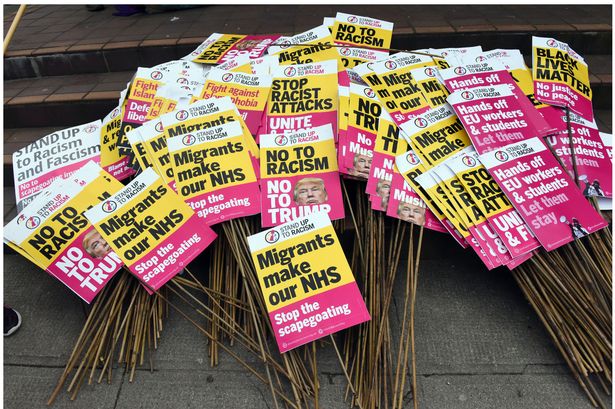“Immigrants are not the problem. They are the solution sometimes. There are currently 48,000 nursing posts vacant. Immigrants could fill those. In some circumstances, immigrants create new jobs, new ideas and new culture.”
— — Joginder Bains
Highlights/ / NRI/
Nishant
The Indian Workers Association (IWA) and Black Community Matters (BCM) want to change people’s views on immigrants, reported derbytelegraph.co.uk.
“What is an immigrant? What are we? I’ve lived here for 52 years. Am I an immigrant or am I British?” That was Joginder Bains who was born in India and moved to Britain in December 1970. More than half a century on, she says that there’s still a huge amount of work to do to banish racism in England. And she’s taking action in Derby with colleagues at the city branch of the Indian Workers Association alongside Black Community Matters to highlight how prejudice can poison our lives.
“Racism has never gone away. But it comes in waves. Sometimes it’ll slow down and then it’ll peak again. And in the pandemic, racism that had been suppressed was exposed. Some people are under the illusion that racism has gone away but it hasn’t and never did,” she said.
She quotes the staggering percentage of black and ethnic minority (BME) deaths from Covid-19. She also references surveys which showed that BME frontline workers felt they had less access to PPE during the pandemic. She also mentions the phrase “increasingly hostile environment.” Her view – and others’ – that racism is on the rise is a view that dates back way before the pandemic; it was just exacerbated by it.
She talks about Brexit and how immigrants were typecast as the cause of Britain’s problems in an attempt to sway voters. Specifically, she refers to the Home Office’s 2013 “Go Home” vans campaign and UKIP’s infamous “breaking point” poster purporting to show queues of migrants waiting to get into the country. It was actually a photo taken in Slovenia.
But it was the government’s response to the Ukraine war which proved to be the straw that broke the camel’s back. “The Ukraine war exposed racism to the extreme,” says Joginder.
“Foreign students pay three times more frees than national students do. They supplement the higher education system in this country and bring in £14 billion pounds every year for the economy. But these are the things that people don’t know. The media don’t show it and the politicians don’t speak about it.”
— Joginder Bains
“The government welcomed refugees with open doors. That was heart-warming. Refugees that were suffering were welcomed and given a human treatment. That’s how every refugee should be treated. Because they’ve suffered enough in their own country. They’ve lost their home, lost their livelihood and lost their loved ones, and they’re fearing for their own lives. That’s why they flee.”
“What about other refugees? They’re not welcome. Other refugees are in exactly the same situation. But they’re seen as burdens swamping the country and parasites. They’re dehumanised. That really did cause a lot of pain. It wasn’t to me directly but I feel it.”
Multiculturalism under the Microscope is a bi-monthly workshop arranged by Joginder and her colleagues at the Derby branch of the Indian Workers Association (IWA), and Sonya Robotham, of Black Community Matters (BCM). In the two-hour meetings, attendees are invited to discuss and debate topics introduced by the hosts surrounding issues concerning views on immigration. “Anyone can come,” said Bains. “That’s what we’re here for. Let’s look at every human being as a human being and look at the bigger picture.”
“Immigrants are not the problem. They are the solution sometimes. There are currently 48,000 nursing posts vacant. Immigrants could fill those. In some circumstances, immigrants create new jobs, new ideas and new culture,” she said.
She pointed out: “Foreign students pay three times more frees than national students do. They supplement the higher education system in this country and bring in £14 billion pounds every year for the economy. But these are the things that people don’t know. The media don’t show it and the politicians don’t speak about it.”
As well as the institutional racism Bains spoke of, there’s also the overt racism which has undoubtedly contributed to hers and others’ feeling that a workshop such as theirs is needed. It’s something she’s dealt with herself as recently as a few years ago, when a friend argued to her that immigrants were undercutting the wages.
“Our hope is to raise awareness,” she said. “We don’t want to raise any aggression or create a counter-hostile environment. It’s the opposite. We want the hostility to be reduced and banished eventually. The world may be too big to totally diminish it but if we can achieve it in our community, convince someone and get them to pass the message on, hopefully it will snowball.”
*************************************************************
Readers
These are extraordinary times. All of us have to rely on high-impact, trustworthy journalism. And this is especially true of the Indian Diaspora. Members of the Indian community overseas cannot be fed with inaccurate news.
Pravasi Samwad is a venture that has no shareholders. It is the result of an impassioned initiative of a handful of Indian journalists spread around the world. We have taken the small step forward with the pledge to provide news with accuracy, free from political and commercial influence. Our aim is to keep you, our readers, informed about developments at ‘home’ and across the world that affect you.
Please help us to keep our journalism independent and free.
In these difficult times, to run a news website requires finances. While every contribution, big or small, will makes a difference, we request our readers to put us in touch with advertisers worldwide. It will be a great help.
For more information: pravasisamwad00@gmail.com




